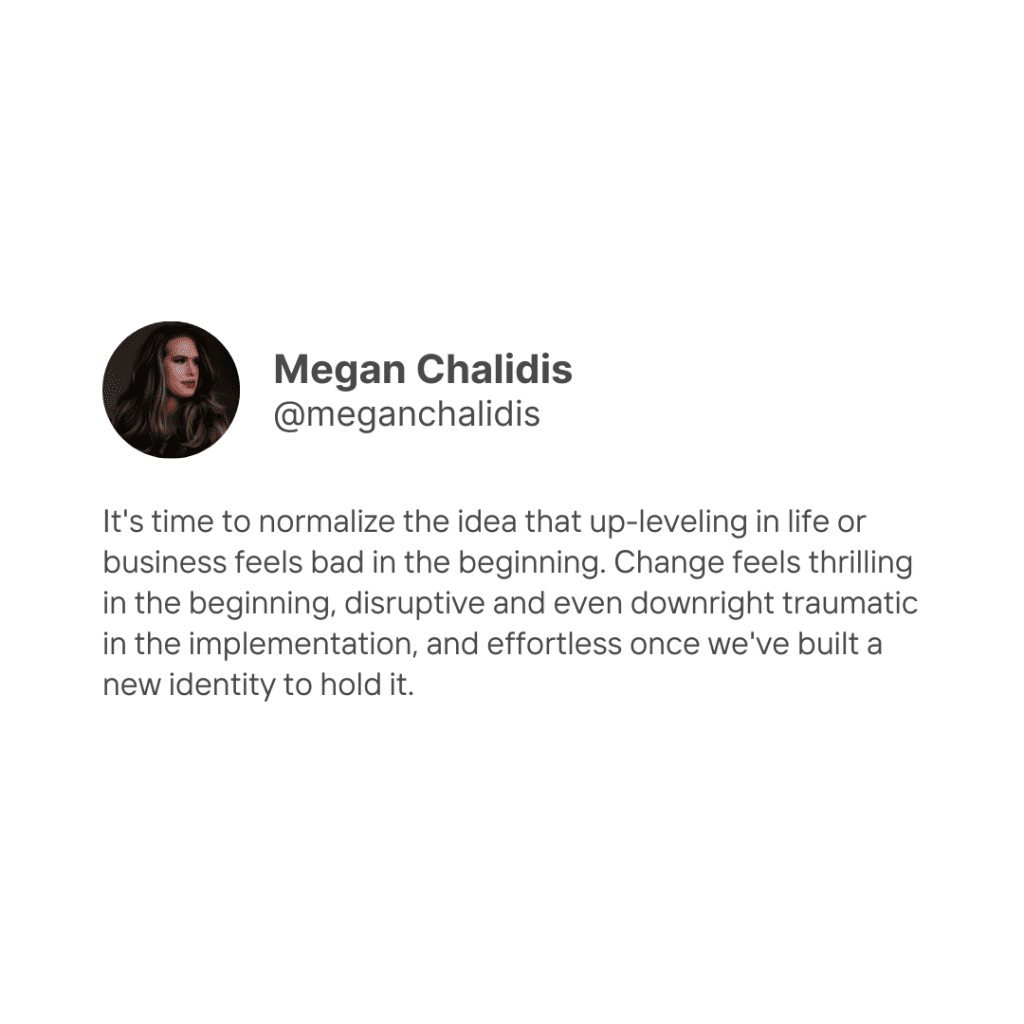THE REAL REASON YOU’RE STUCK AT THE SAME INCOME LEVEL AND HOW TO ESCAPE YOUR INVISIBLE PRISON
P.s. It Has Nothing To Do With Your Business Strategy

Hey there, rockstars! Today, I want to delve into a powerful topic that has been on my mind for ages. Have you ever wondered why some people experience incredible quantum leaps in their lives and businesses while others seem trapped in a cycle of repeating and recreating the same reality in their health, wealth and relationships year after year? It’s a puzzling phenomenon. I’ve seen it in my clients, I’ve seen it in my own experience, and I believe that I may have finally cracked the code. Today, I’ll share with you the real reason you’re stuck at the same income level – and why it has nothing to do with your business strategy.
THE HIDDEN BLOCKADE: HOW SANDRA’S JOURNEY TO ELEVATE HER REVENUE TOOK AN UNEXPECTED TURN
Let’s dive deeper into a case study to better understand this phenomenon. Meet Sandra, an ambitious entrepreneur, and coach. She’s eager to elevate her revenue, raise her standards, and enjoy more freedom and flexibility in her lifestyle. To help her achieve these goals, we embark on a coaching journey together. We dig into her business systems, back end, marketing, and offer suite. Together we identify that if Sandra wants to hit her revenue goals this year, she’s going to have to gradually increase her pricing so it reflects the true value of the transformation she offers her clients. Initially, Sandra is totally on board. She’s excited and she knows without a shadow of a doubt that this one move could change it all in the best possible way, but something interesting happens next…
THE UNCOMFORTABLE TRANSFORMATION: WHEN ANXIETY HINDERS PROGRESS
Shortly after committing to raising her prices and notifying her clients, Sandra wakes up one morning experiencing an overwhelming sense of anxiety. Her heart rate is elevated. She’s sweating – and incredibly restless. She tries to distract herself from her internal state by taking time off to deep clean her house and rearrange her furniture. Because surely that’s what’s stopping her from sitting down and finally sending that email to notify her clients about her price increase.
Her discomfort continues to build as the days progress and Sandra decides that before she raises her rates, the most logical thing to do would be to refilm the modules of her coaching program and rebrand everything to match the new rates she will be charging.
She’s jumping frantically from task to task, but still not making progress on the real assignment.
Her nervous system is running in overdrive. You know, kind of like that feeling of being chased by an invisible predator.

NAVIGATING THE TRAUMA RESPONSE: UNDERSTANDING SANDRA’S BEHAVIOR
So why is Sandra feeling this way? And why is it that instead of focusing on the one simple task that will move her forward, she finds herself reinventing everything in her business instead?
The discomfort she feels is actually the result of her nervous system understanding that this small change requires stepping into a new emotional and strategic territory – a new identity in fact. Our brains and nervous systems are wired to keep us safe, favoring the comfort of the familiar over the uncertainty of change.
So as Sandra grapples with her pricing shift, she may experience various stress responses triggered by her nervous system in an attempt to maintain identity coherence within her comfort zone. Let’s take a look at how each response could manifest for Sandra:

BATTLE MODE ENGAGED
When faced with the prospect of raising her pricing, Sandra’s trauma response may manifest as a fight response. This could lead to defensiveness and stubbornness, where she resists any suggestion of increasing her prices. She might become protective of her current pricing structure, clinging to the belief that it’s the only way to maintain her customer base. This response can stem from a fear of losing clients or being perceived as greedy. She may even vilify her coach at this point as she projects her fight response outwards to maintain her current internal reality. Sandra’s defensiveness serves as a shield to protect her from potential rejection or criticism.
BIRDS OF FLIGHT: THE RUNAWAY RESPONSE
Another way Sandra’s trauma response may manifest is through a flight response. She might avoid confronting the issue of raising prices altogether, choosing instead to play it safe and stay within her comfort zone. This flight response stems from a fear of the unknown and the potential risks associated with making changes. Sandra may worry that increasing her prices will result in losing clients or facing financial instability.
FROZEN IN FEAR
Sandra’s trauma response can also manifest as a freeze response. This can lead to inaction and paralysis when it comes to pricing decisions. Sandra may feel overwhelmed by the thought of making changes or uncertain about how to navigate the complexities of adjusting her pricing structure. As a result, she remains stuck in a state of inaction, unable to take the necessary steps to raise her prices. The freeze response often stems from a fear of making the wrong decision or the fear of failure.
THE SELF-SACRIFICIAL LAMB
Lastly, Sandra’s trauma response may manifest as a fawn response. This can manifest as a tendency to people-please and self-sacrifice, even at the expense of her own well-being. Sandra might avoid raising her prices out of fear of alienating her clients or appearing selfish. She may believe that by keeping her prices low, she is being accommodating and ensuring client satisfaction. This response is rooted in a deep need for external validation and a fear of rejection or criticism.
Recognize yourself in any of these patterns?

REDEFINING POSSIBILITIES: EXPANDING YOUR IDENTITY TO EMBRACE BUSINESS AND FINANCIAL GROWTH
When we strive for significant shifts in our lives and businesses, our identity must adapt accordingly. Even positive changes can trigger stress responses, as they challenge the boundaries of our existing comfort zones.
To illustrate this, let’s imagine someone who has endured financial struggles for years and suddenly wins the lottery. While this influx of wealth might seem like a dream come true, it can swiftly transform into a nightmare. Their identity and nervous system resist this change, forcefully pulling them back into their previous financial circumstances. Our bodies naturally gravitate towards what is known and perceived as safe, even if it contradicts our conscious desires.
This phenomenon is why statistics show that 70% of lottery winners end up broke and a third go on to declare bankruptcy, according to the National Endowment for Financial Education. Such a huge shift in identity can be perceived as incredibly traumatic for the nervous system without the proper strategies in place to support this shift.
Returning to Sandra’s story, her nervous system response is deeply intertwined with her identity as an entrepreneur and coach. It’s crucial for Sandra to recognize that her current income level is not indicative of her true potential. By consciously expanding her identity and challenging the boundaries of her comfort zone, she can gradually redefine what is possible for her business and financial success.
THE BODY’S DOUBLE-EDGED SWORD: HOW OUR PHYSICAL SENSATIONS CAN MISLEAD US DURING GROWTH
Listening to our bodies is often seen as a valuable tool for self-awareness and decision-making. It’s important to pay attention to physical sensations, emotions, and intuitive feelings that arise within us. However, solely relying on our bodily cues can sometimes lead us astray, particularly when it comes to navigating periods of growth, change, and up-leveling in our lives.
During moments of significant personal growth, such as improving relationships, health, wealth, or business, it’s not uncommon to experience a sense of chaos or upheaval beforehand. Our nervous system can go into a stress response as we grapple with a new identity, shifting beliefs, and ways of showing up in the world. This can manifest as anxiety, elevated heart rate, racing thoughts, nightmares, and other symptoms that may seem out of character or distressing.
DECODING THE SIGNALS: DISTINGUISHING BETWEEN GENUINE MISALIGNMENT AND NERVOUS SYSTEM STRESS
So how do we distinguish between our bodies letting us know that something is wrong for us – versus a nervous system stress response?
To distinguish between a genuine misalignment and a nervous system stress response, it’s essential to recognize the subtle differences. Although our bodies can alert us to potential issues and guide us away from the wrong path, they can also trigger anxiety and fear during times of growth. It’s crucial to develop an awareness of our own unique trauma responses and how they manifest in our lives.
One approach to gain clarity is to reflect on previous experiences of growth and up-leveling. By examining the periods leading up to significant advancements, we can identify patterns and emotions that emerged during those times. For example, after a major successful launch, someone might have experienced heightened anxiety, elevated heart rates, and distressing dreams. Recognizing these patterns can help us understand the nervous system’s response to change and growth.
Another useful practice is to track the recurring thoughts we have during these transformative phases. By observing the thoughts that arise, we can gain insight into whether we are experiencing a growth phase or a genuine misalignment. Sometimes, the mind might idealize past experiences or comfort zones as a way to resist change and keep us in familiar territory. This idealization can be a sign that our body is attempting to bring us back to a place of safety rather than indicating that our current path is truly misaligned.
To discern between a stress response and misalignment, we can ask a simple but powerful question: Will the decision or action I’m about to take expand or contract my life? This question helps us cut through the fear response triggered by our body and provides a logical perspective from our higher consciousness. While our body might signal discomfort or resistance during a growth phase, focusing on the expansion of opportunities for success, happiness, joy, and wealth can help us make informed decisions that move us forward.
For example, when I was making the transition from one-on-one coaching to group coaching, I experienced huge waves of anxiety for months on end. My brain kept coming up with seemingly logical reasons not to take the leap. I worried that no one would want to join my programs or that I didn’t have a big enough audience to launch my offer to the world. I even began to idealize the idea of skipping this whole entrepreneurial adventure and working for someone else instead. But as I began to realize that this move would support me to expand my business, touch more lives, and experience a more abundant reality, I was able to soothe my body’s stress response by taking action to regulate my nervous system and take tiny daily actions towards my goals.
NAVIGATING THE UNCOMFORTABLE: CHALLENGING THE ‘FEEL GOOD’ CULT
It’s essential to recognize that the initial stages of growth and up leveling may not feel comfortable or pleasant. Many transformative experiences involve shedding old identities and embracing new ones, which can be unsettling. If we strictly adhere to doing only what feels good or comfortable, we risk remaining stagnant in our comfort zones and missing out on deeper personal and professional growth.
While the advice of doing only what feels good or ‘aligned’ may come from well-intentioned coaches, it’s crucial to understand the biological workings of the nervous system. Genuine up levels often elicit discomfort before your new reality becomes normalized. It’s akin to shedding one’s skin and adopting a new identity—a process that can feel uncomfortable and foreign. By recognizing this and understanding the intricacies of our nervous system, we can avoid the trap of staying in our comfort zones and instead embrace growth and expansion.
In summary, while listening to our bodies is valuable, it’s important to be aware of its potential to mislead us during periods of growth and up-leveling. By recognizing the difference between a nervous system stress response and a genuine misalignment, we can make informed decisions that expand our lives rather than contracting them. It’s through this understanding and conscious action that we can break free from our comfort zones and achieve transformative personal and professional growth.

CONQUERING FEAR: REBUILDING OUR CAPACITY TO HOLD SUCCESS
So what’s the solution to growing despite our fear responses to change? Taking action in spite of fear.
And in doing so, slowly rebuild our identities so we’re able to hold new levels of success one step at a time.
It can also be supportive to work with a nervous system-aware mentor who can help you uncover and interrupt your own unique patterns and responses that are keeping you stuck.

IN SUMMARY
Doing only what feels good in business is a sure-fire way to get stuck at the same level of health, wealth, and happiness for the rest of your life.
* Your brain and nervous system have one function – to keep you alive. To do that, it prefers to keep you stuck in a loop of recreating your familiar comfort zone over and over again.
* Real growth lies in feeling the fear and taking micro actions daily towards building the identity and reality you desire.
* Working with a mentor can be a fantastic way to get support while navigating your own identity shift. This alone has been responsible for almost every major uplevel I have been able to navigate successfully.
JOURNALING & REFLECTION
Here are some of my favorite reflection questions from today’s topic:
* Have you ever found yourself stuck in a cycle of repeating the same reality in your health, wealth, or relationships? Reflect on any patterns you have observed in your own life.
* Can you recall a time when you experienced a significant period of growth or up-leveling? What were the emotions and physical sensations that arose during that time? How did your nervous system respond?
* Which trauma response (fight, flight, freeze, or fawn) do you resonate with the most when faced with potential changes or challenges? How does this response manifest in your life, particularly when it comes to expanding your comfort zone?
* Reflect on a time when you relied solely on bodily cues or intuitive feelings to make a decision. Did this approach lead you astray, or did it guide you in the right direction? How might a nervous system stress response have influenced your perception in that situation?
* Consider a current decision or action you’re contemplating. Ask yourself: Will this decision or action expand or contract my life? How does this question help you cut through the fear response triggered by your body and gain a logical perspective from your higher consciousness?

Meet The Author
I am a luxury business strategist and writer with an Italian cappuccino fetish and a 3-day work-week. With a personal love for indulgence and the finer things in life, I’ve seamlessly blended my passion for dissecting profitable businesses with the art of curating a life of pleasure. My obsession? Unraveling the DNA of success and happiness while teaching you how to beautifully disrupt the norm by crafting a business and life that you can’t wait to wake up to on a Monday morning.
P.S. WHENEVER YOU’RE READY HERE’S HOW I CAN SUPPORT YOU TO
ELEVATE YOUR REVENUE,
FREE YOUR TIME & DESIGN A LIFE AND BUSINESS YOU LOVE
1) Discover more free content on how to make more, work less, and live your dreamiest life by visiting The Champagne Lounge blog here.
2) Get access to my latest self-study program, The Elevated Business Experience, and discover 6-weeks of self-paced content designed to support you to raise your standards, elevate your revenue, and experience more play, pleasure, and freedom in your business journey.
3) Work with me privately to rapidly accelerate your results by applying to join The Inner Circle. This high-touch, high-proximity container is your vehicle for doubling your revenue, cutting back your hours, and turning your business into your dream lifestyle fulfillment machine.



Great article Megan, it has really got me thinking about so many of my common responses. I think I often to into fight or freeze mode.